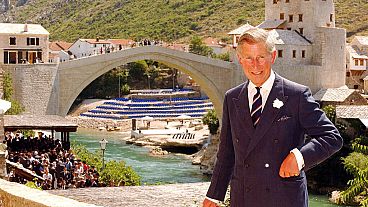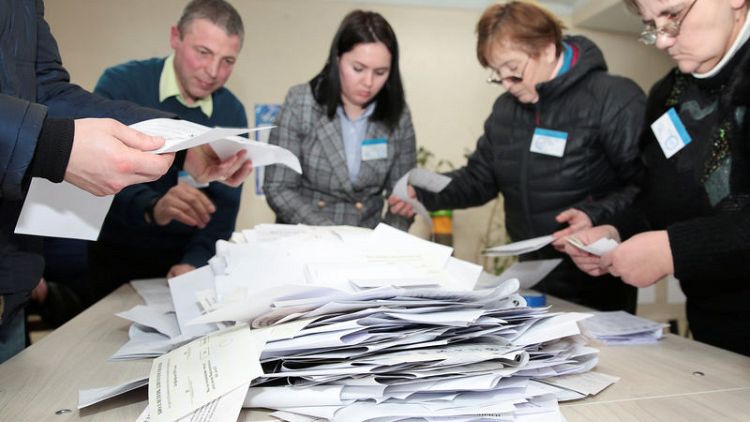By Alexander Tanas
CHISINAU (Reuters) - Early results pointed to a hung parliament in Moldova's election on Sunday, splitting the vote between pro-Western and pro-Russian forces at a time when the ex-Soviet republic's relations with the European Union have soured.
The current government wants closer EU integration and warns of catastrophe if the country falls back into Russia's sphere of influence.
But corruption scandals and worries over the health of its democracy have tarnished the country's image and weakened the appeal of the pro-Western political class.
The opposition Socialist Party, which favours closer ties to Moscow, took a slight early lead at 29.5 percent, with 30 percent of votes counted. The ruling pro-Western Democratic Party trailed with 28.8 percent, while an opposition bloc called ACUM, campaigning to fight entrenched corruption, was third with 22 percent.
A clearer picture of the final tally will emerge on Monday.
An inconclusive election or one marred by allegations of fraud could tip the country back into instability just as it has recovered from a $1 billion banking scandal in 2014 and 2015.
If the results are split, it could set the stage for weeks of coalition talks or another election.
"If no one has a parliamentary majority, I think that there will be attempts to form it, but the risk is high that it could come to a snap election in the coming few months," President Igor Dodon told reporters.
On Saturday, Dodon, the former Socialist Party chief, called the campaign "one of the dirtiest in our entire history". He and leading opposition figures have threatened to launch street protests and raised concerns about vote-buying.
"If the elections are rigged even more than they have already been rigged to this day, we will come out to protect our vote," ACUM leader Maia Sandu said.
POISONED POLITICS
The campaign has already been dogged by controversy.
In the past few days alone, ACUM's leaders said they were being poisoned on the orders of the authorities, which the Democratic Party swiftly dismissed as a "strange accusation".
Russia's interior ministry announced an investigation into Democratic Party leader Vladimir Plahotniuc, accusing him of involvement in organised crime, prompting Plahotniuc's party to accuse Moscow of election meddling.
The Democratic Party had already been accused of trying to bend the electoral system in its favour by introducing changes in 2017 on how votes are cast.
Previously, Moldovans voted on party lists, but the Democratic Party introduced a mixed system of party lists and first-past-the-post constituency races, against the advice of European rights experts. The Democratic Party rejects suggestions it benefits most from the new voting system.
It has in turn accused Dodon of colluding with Russia to put the Socialists in power, which the president denies.
"Moldova has the potential for development, it's only necessary that the authorities not be corrupt, that they should think about the people, and not only about their own pockets," said Alexandra Ciorescu, a 72-year-old pensioner.
BELIEVING IN THE FUTURE
The EU forged a deal on closer trade and political ties with Moldova in 2014 but has become increasingly critical of Chisinau's track record on reforms.
One of Europe's poorest countries, which is squeezed between Ukraine and EU member state Romania, Moldova plunged into crisis in 2014 and 2015 after $1 billion was pilfered from three banks.
The EU froze aid after a court struck down the victory in the Chisinau mayoral race of one of ACUM's leaders, Andrei Nastase, on a technicality last year. The European Parliament declared it "a state captured by oligarchic interests".
Plahotniuc's party has trumpeted the achievements of its government under Prime Minister Pavel Filip. The economy is growing, the banking system has stabilised and cooperation with the International Monetary Fund resumed.
"I believe in the future of Moldova," Filip said after casting his vote. "We are ready to continue reforms and all social programmes, the implementation of which will change the lives of Moldovan citizens for the better."
Dodon and the Democratic Party have clashed over issues ranging from relations with Russia to ministerial appointments. But some Moldovans suspect that the Socialists and Plahotniuc collaborate behind the scenes to carve up the state between themselves - a suggestion rejected by Dodon in a Reuters interview in January.
(Reporting by Alexander Tanas; Additional reporting by Pavel Polityuk in Kiev; Writing by Matthias Williams; Editing by Jason Neely and Peter Cooney)












